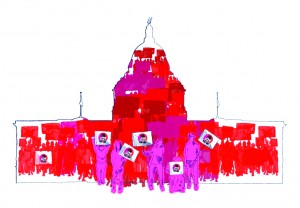 As a lifelong Rhode Islander, I’m ashamed to admit how few times I had been inside our State House prior to 2016. Maybe a school field trip or two? Maybe? But on that fateful election night more than two years ago, the world turned upside down and I, along with millions of other devastated and distraught Americans from all across the country, felt compelled to try to do something, anything, to set it right. I started going to every protest, every rally, every meeting of concerned citizens I could find. I had no idea what I could do to fix our new political reality and the very real dangers it posed, but I didn’t feel like sitting around and waiting to figure it out.
As a lifelong Rhode Islander, I’m ashamed to admit how few times I had been inside our State House prior to 2016. Maybe a school field trip or two? Maybe? But on that fateful election night more than two years ago, the world turned upside down and I, along with millions of other devastated and distraught Americans from all across the country, felt compelled to try to do something, anything, to set it right. I started going to every protest, every rally, every meeting of concerned citizens I could find. I had no idea what I could do to fix our new political reality and the very real dangers it posed, but I didn’t feel like sitting around and waiting to figure it out.
Now, it seems, I visit the State House more often than I visit some members of my family. In the last two years I’ve been there at least a dozen times, fighting for issues ranging from immigrant rights to trans issues to gun control to environmental justice. I’ve even faced down neo-nazis in the pouring rain (workers.org/2018/08/11/providence-r-i-activists-drive-out-far-right/)! At one such visit, a rally aimed at getting the vice chair of the RI Democratic Party to resign over his dismissive comments about sexual harassment, I became acquainted with a woman who would completely change the trajectory of my activism and give it a much-needed focus.
The woman I met that day was Jordan Hevenor who, along with Jocelyn Foye, co-founded The Womxn Project, a grassroots organization aimed at “using art and activism to advance education and social change.” From postcard campaigns to staging rallies to creating mobile art installations, The Womxn Project (TWP) has been at the forefront of the fight for reproductive freedom in RI for the past two years. By combining Hevenor’s keen understanding of the legislative process with Foye’s boldness and artistic vision, the two have worked tirelessly to build movement around the issue of codifying Roe v. Wade into Rhode Island law.
But why would we need to codify a Supreme Court decision into state law, you ask? Well, although Rhode Island is one of the bluest states in the union, we also have some extremely restrictive laws on our books regarding abortion. Many of these laws have been found unconstitutional or unenforceable on the national level, but they remain part of Rhode Island’s legal framework with respect to abortion. So long as the Supreme Court decisions governing abortion rights remain intact, our right to abortion in Rhode Island is protected. But if Roe v. Wade (or the later decision, Planned Parenthood v. Casey) is overturned or weakened, the right to safe and legal abortion in Rode Island would be in great peril. This potential peril has been on the minds of state lawmakers for years.
The Reproductive Healthcare Act (RHCA) and its amended version, the Reproductive Privacy Act (RPA), seek to maintain the status quo in Rhode Island by striking those unconstitutional and unenforceable laws off the books. Like with any legislative battle, this one has been years in the making. If you remember your Schoolhouse Rock, you’ll know that bills have to be proposed, then they go to committee where people from the public can testify on their merits, and if the committee votes them forward, they go on to a floor vote by the legislators. This happens for both chambers of our legislature. Until now, the various forms of the RHCA died in committee, if they even got that far. But now, thanks to the efforts of TWP, along with several dogged legislators and the 19 other member organizations that make up the Coalition for Reproductive freedom, the RHCA has never been so close to being passed into law.
My own personal journey as a fledgling activist has lead me all the way to TWP’s board, and I’ve seen first-hand how harnessing collective determination can lead directly to legislative action. We connect and encourage our friends to stand up with us through social media. We give our time by showing up for rallies, canvassing our neighborhoods and writing postcards to send to other concerned voters. We spend hours testifying at hearings, or just stand strong in the State House rotunda on vote days, taking all of the harassment and abuse that comes with it. The onslaught of the past few years has sometimes made us feel powerless and overwhelmed, but it has also made us aware of our capacity for action to effect real change. Let’s hope this new wave of citizen-activism continues far beyond the current administration to create a more vibrant vision of what is possible for our world.